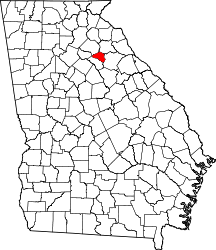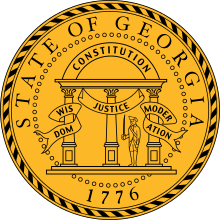Athens, Georgia
| Athens | |
|---|---|
| Consolidated city–county | |
| Athens-Clarke County | |
| Nickname(s): "The Classic City" | |
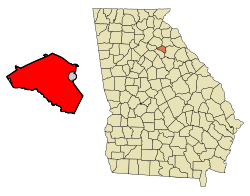 Location in Clarke County and the state of Georgia | |
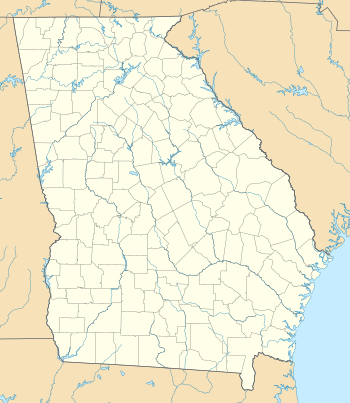 Athens Location in Georgia | |
| Coordinates: 33°57′N 83°23′W / 33.950°N 83.383°WCoordinates: 33°57′N 83°23′W / 33.950°N 83.383°W | |
| Country | United States |
| State | Georgia |
| County | Clarke |
| Government | |
| • Mayor | Nancy Denson |
| Area | |
| • Consolidated city–county | 118.2 sq mi (306.2 km2) |
| • Land | 117.8 sq mi (305.0 km2) |
| • Water | 0.5 sq mi (1.2 km2) |
| Elevation | 636 ft (194 m) |
| Population (2010) | |
| • Consolidated city–county | 115,452 |
| • Density | 851.5/sq mi (328.8/km2) |
| • Metro | 192,541 |
| Time zone | EST (UTC-5) |
| • Summer (DST) | EDT (UTC-4) |
| ZIP code | 30601, 30602, 30603, 30604, 30605, 30606, 30607, 30608, 30609, 30612 |
| Area code(s) | 706/762 |
| FIPS code | 13-03440[1] |
| Website | athensclarkecounty.com |
Athens (formally known as Athens-Clarke County) is a consolidated city–county in the U.S. state of Georgia, in the northeastern part of the state, comprising the former city of Athens proper (the county seat) and Clarke County. The University of Georgia, the state's flagship public research university, is located in this college town, and contributed to its initial growth. In 1991, after a vote the preceding year, the original city abandoned its charter to form a unified government with Clarke County, referred to jointly as Athens-Clarke County.[2] As of the 2010 census, the consolidated city-county (including all of Athens-Clarke County except Winterville and a portion of Bogart) had a total population of 115,452; all of Clarke County had a population of 116,714.[3] Athens is the sixth-largest city in Georgia, and the principal city of the Athens-Clarke County, Georgia Metropolitan Statistical Area,[4] which had a population of 192,541 as of the 2010 census.[5] Athens-Clarke County has the smallest geographical area of a county in Georgia.
History
_1936_Historic_American_Buildings_Survey.jpg)
In the late 18th century, a trading settlement on the banks of the Oconee River called Cedar Shoals stood where Athens is located today. On January 27, 1785, the Georgia General Assembly granted a charter by Abraham Baldwin for the University of Georgia as the first state-supported university. Sixteen years later, in 1801, a committee from the university's board of trustees selected a site for the university on a hill above Cedar Shoals in what was then Jackson County. On July 25, John Milledge, one of the trustees and later governor of Georgia, bought 633 acres (256 ha) from Daniel Easley and donated it to the university. Milledge named the surrounding area Athens after the city that was home to the academy of Plato and Aristotle in Greece.[6]
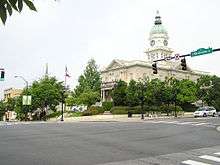
The first buildings on the University of Georgia campus were made from logs. The town grew as lots adjacent to the college were sold to raise money for the additional construction of the school. By the time the first class graduated from the university in 1804, Athens consisted of three homes, three stores and a few other buildings facing Front Street, now known as Broad Street. Completed in 1806 and named in honor of Benjamin Franklin, Franklin College was the University of Georgia's and the City of Athens' first permanent structure. This brick building is now known as Old College.
Athens officially became a town in December 1806 with a government made up of a three-member commission.[7] The university continued to grow, as did the town, with cotton mills fueling the industrial and commercial development. Athens became known as the "Manchester of the South" after the city in England known for its mills. In 1833 a group of Athens businessmen led by James Camak, tired of their wagons getting stuck in the mud, built one of Georgia's first railroads, the Georgia, connecting Athens to Augusta by 1841, and to Marthasville (now Atlanta) by 1845. In the 1830s and 1840s, transportation developments combined with the growing influence of the University of Georgia made Athens one of the state's most important cities as the antebellum era neared the height of its development. The university essentially created a chain reaction of growth in the community which developed on its doorstep.[8]
During the American Civil War, Athens became a significant supply center when the New Orleans armory was relocated to what is now called the Chicopee building. Fortifications can still be found along parts of the North Oconee River between College and Oconee St. In addition, Athens played a small part in the ill-fated Stoneman Raid when a skirmish was fought on a site overlooking the Middle Oconee River near what is now the old Macon Highway.[9] As in many southern towns, there is a Confederate memorial. It is located on Broad Street, near the University of Georgia Arch.
During Reconstruction, Athens continued to grow. The form of government changed to a mayor-council government with a new city charter on August 24, 1872, and Captain Henry Beusse became the first mayor of Athens.[10] Henry Beusse was instrumental in the rapid growth of the city after the Civil War. After holding the position of mayor he worked in the railroad industry and helped to bring railroads to the region creating growth in many of the surrounding communities. Freed slaves moved to the city. Many were attracted by the new centers for education such as the Freedmen's Bureau. This new population was served by three black newspapers: the Athens Blade, the Athens Clipper, and the Progressive Era.[11]
In the 1880s, as Athens became more densely populated, city services and improvements were undertaken. The Athens Police Department was founded in 1881 and public schools opened in fall of 1886. Telephone service was introduced in 1882 by the Bell Telephone Company. Transportation improvements were also introduced with a street paving program beginning in 1885 and streetcars, pulled by mules, in 1888.
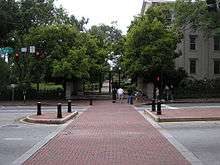
By its centennial in 1901, Athens was a much-changed city. A new city hall was completed in 1904. An African-American middle class and professional class grew around the corner of Washington and Hull Streets, known as the "Hot Corner", where the Morton Building was constructed in 1910.[12] The theater at the Morton Building hosted movies and performances by black musicians such as Louis Armstrong, Cab Calloway, and Duke Ellington. In 1907 aviation pioneer Ben T. Epps became Georgia's first pilot on a hill outside town that would become the Athens-Ben Epps Airport. Athens got its first tall building in 1908 with the seven-story Southern Mutual Insurance Company building.
During World War II, the U.S. Navy built new buildings and paved runways to serve as a training facility for naval pilots. In 1954, the U.S. Navy chose Athens as the site for the Navy Supply Corps school. The school was located in Normal Town in the buildings of the old Normal School. The school closed in 2011 under the Base Realignment and Closure process. The 56 acres (23 ha) site is now home to the GHSU/UGA Medical Partnership, the UGA College of Public Health, and other health-related programs
In 1961, Athens witnessed part of the civil rights movement when Charlayne Hunter and Hamilton Holmes became the first two black students to enter the University of Georgia.[13] Despite the Brown vs. Board of Education Supreme Court ruling in 1954, the Athens–Clarke County school district remained segregated until 1964.
Geography
According to the United States Census Bureau, the balance has a total area of 118.2 square miles (306.1 km2), of which 117.8 square miles (305.1 km2) is land and 0.5 square miles (1.3 km2) (0.41%) is water.
Athens lies within the humid subtropical climate zone, with hot, humid summers and mild to moderately cold winters. Annual rainfall averages 49.7 inches (1,260 mm). Light to moderate snowfall can occur in winter. In the spring, frequent thunderstorms can sometimes become severe, even producing tornadoes. The city itself sits on a series of anomalous hills, unique to the Piedmont region.
Climate
Athens has a humid subtropical climate.[14] Its climatic regime is in many ways typical of Southeastern United States with long and hot summers transitioning into short and cool winters, but with precipitation being consistently high throughout the year.
| Climate data for Athens, Georgia (Ben Epps Airport), 1981–2010 normals | |||||||||||||
|---|---|---|---|---|---|---|---|---|---|---|---|---|---|
| Month | Jan | Feb | Mar | Apr | May | Jun | Jul | Aug | Sep | Oct | Nov | Dec | Year |
| Record high °F (°C) | 80 (27) |
81 (27) |
89 (32) |
97 (36) |
100 (38) |
109 (43) |
108 (42) |
107 (42) |
108 (42) |
98 (37) |
86 (30) |
80 (27) |
109 (43) |
| Average high °F (°C) | 53.9 (12.2) |
58.2 (14.6) |
66.2 (19) |
74.0 (23.3) |
81.8 (27.7) |
88.7 (31.5) |
91.4 (33) |
89.9 (32.2) |
84.0 (28.9) |
74.4 (23.6) |
65.2 (18.4) |
55.7 (13.2) |
73.6 (23.1) |
| Average low °F (°C) | 33.1 (0.6) |
36.3 (2.4) |
42.5 (5.8) |
49.3 (9.6) |
58.2 (14.6) |
66.4 (19.1) |
69.8 (21) |
69.3 (20.7) |
62.7 (17.1) |
51.5 (10.8) |
42.4 (5.8) |
35.0 (1.7) |
51.4 (10.8) |
| Record low °F (°C) | −4 (−20) |
3 (−16) |
11 (−12) |
26 (−3) |
37 (3) |
45 (7) |
55 (13) |
53 (12) |
36 (2) |
24 (−4) |
7 (−14) |
2 (−17) |
−4 (−20) |
| Average precipitation inches (mm) | 4.05 (102.9) |
4.48 (113.8) |
4.42 (112.3) |
3.14 (79.8) |
3.00 (76.2) |
4.18 (106.2) |
4.47 (113.5) |
3.52 (89.4) |
3.94 (100.1) |
3.55 (90.2) |
3.82 (97) |
3.73 (94.7) |
46.29 (1,175.8) |
| Average snowfall inches (cm) | 1.6 (4.1) |
.8 (2) |
.9 (2.3) |
0 (0) |
0 (0) |
0 (0) |
0 (0) |
0 (0) |
0 (0) |
0 (0) |
0 (0) |
.3 (0.8) |
3.5 (8.9) |
| Average precipitation days (≥ 0.01 in) | 10.4 | 9.5 | 9.3 | 8.2 | 8.7 | 10.8 | 10.5 | 9.1 | 7.7 | 6.8 | 8.6 | 9.9 | 109.6 |
| Average snowy days (≥ 0.1 in) | .8 | .5 | .2 | 0 | 0 | 0 | 0 | 0 | 0 | 0 | 0 | .3 | 1.8 |
| Source: NOAA (extremes 1884–present)[15] | |||||||||||||
Neighborhoods
|
|
|
Demographics
| Historical population | |||
|---|---|---|---|
| Census | Pop. | %± | |
| 1810 | 273 | — | |
| 1850 | 1,661 | — | |
| 1860 | 3,848 | 131.7% | |
| 1870 | 4,251 | 10.5% | |
| 1880 | 6,099 | 43.5% | |
| 1890 | 8,639 | 41.6% | |
| 1900 | 10,245 | 18.6% | |
| 1910 | 14,913 | 45.6% | |
| 1920 | 16,748 | 12.3% | |
| 1930 | 18,192 | 8.6% | |
| 1940 | 20,650 | 13.5% | |
| 1950 | 28,180 | 36.5% | |
| 1960 | 31,355 | 11.3% | |
| 1970 | 44,342 | 41.4% | |
| 1980 | 42,549 | −4.0% | |
| 1990 | 45,734 | 7.5% | |
| 2000 | 100,266 | 119.2% | |
| 2010 | 115,452 | 15.1% | |
| Est. 2015 | 122,604 | [16] | 6.2% |
As of the census[1] of 2010, there were 100,266 people, 39,239 households, and 19,344 families residing in the city. The population density was 851.5 people per square mile (328.8/km²). There were 41,633 housing units at an average density of 353.6 per square mile (136.5/km²). The racial makeup of the city was 64.71% White, 27.37% Black or African American, 0.21% Native American, 3.15% Asian, 0.04% Pacific Islander, 3.11% from other races, and 1.41% from two or more races. Hispanic or Latino of any race were 6.39% of the population.
The large population increase from 1990 to 2000 reflects the altered boundaries that came with the consolidation of Athens and Clarke County, not just the influx of new residents.
There were 39,239 households out of which 22.3% had children under the age of 18 living with them, 32.3% were married couples living together, 13.3% had a female householder with no husband present, and 50.7% were non-families. 29.9% of all households were made up of individuals and 5.8% had someone living alone who was 65 years of age or older. The average household size was 2.35 and the average family size was 2.95.
In the city the population was spread out with 17.8% under the age of 18, 31.6% from 18 to 24, 27.3% from 25 to 44, 15.3% from 45 to 64, and 8.0% who were 65 years of age or older. The median age was 25 years. For every 100 females there were 95.4 males. For every 100 females age 18 and over, there were 93.4 males.
The median income for a household in the city was $28,118, and the median income for a family was $41,407. Males had a median income of $30,359 versus $23,039 for females. The per capita income for the balance was $17,103. About 15.0% of families and 28.6% of the population were below the poverty line, including 25.2% of those under age 18 and 13.5% of those age 65 or over.
Government
- Legislative: The government is headed by an elected mayor and 10 elected commissioners from 10 equally divided districts. Previously, they have been formed from 8 geographical districts and 2 super-districts covering districts 1–4 and 5–8
- Executive: The Unified Government of Athens-Clarke County's day-to-day operations are overseen by a manager appointed by the Mayor and Commission. There are 26 main departments, divisions and offices under the managerial group
- Judicial: Athens-Clarke County houses Magistrate, Juvenile, Municipal, Probate, State and Superior Courts. Superior Court covers the Western Judicial Circuit, which also includes Oconee County.[18]
Economy
Businesses
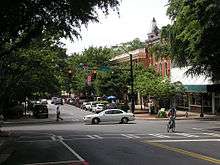
Athens is home to a growing number of young technology companies including Docebo, Roundsphere, and Cogent Education. The city is also home to more established technology companies such as Partner Software, Peachtree Medical Billing, and Digital Insight.
Independent publisher Hill Street Press is headquartered here. Authors with previous, or current, residence in the city include Pulitzer Prize winners Deborah Blum and Edward Larson, as well as Judith Ortiz Cofer, Reginald McKnight and Coleman Barks.
Tourism
Every spring, there are bicycle races collectively known as the Twilight Series. One is the Twilight Criterium.
Competitiveness
In 2010 the average household rent in Athens was $962. The national average was $1087.[19] The Athens population, 25 years old or up, with a bachelor's degree or higher is 39.3%.[20]
Arts and culture
The Georgia Museum of Art has been since 1982 the official state art museum. Culture coexists with the university students in creating an art scene, music scene and intellectual environment. The city has music venues, restaurants, bars, and coffee shops that cater to its creative climate.
Points of interest

- One of the remaining two double barreled cannons produced during the American Civil War is located here.
- The "Tree That Owns Itself," which is now an offspring of the original tree
- The Georgia Museum of Art, the official state museum of art
- The State Botanical Garden of Georgia
- The University of Georgia Campus Arboretum
- St. Mary's Steeple, home of the First R.E.M. show and site for newly founded renovation.[21]
- The Globe bar was voted by Esquire magazine as the third top bar in America in 2007.[22]
- Founded in 1955, Allen's is Athens' oldest bar and grill despite closing in 2004, re-opening in 2007, and closing again in November, 2011.[23]
- Network Translations, Inc. developed here. It produced the PIX firewall which was later purchased by Cisco Systems.
Music
The Athens music scene grew in the early 1970s and later during the 1980s with the Georgia Theatre and 40 Watt Club as the bands R.E.M. and the B-52's scored breakout hits. Other notable bands were Widespread Panic, Dreams So Real, Indigo Girls, Vigilantes of Love, Matthew Sweet, The Method Actors, Love Tractor, Pylon, Flat Duo Jets, The Primates, Modern Skirts, The Whigs, and Corey Smith.
National acts that have come out of Athens include: The Whigs, Reptar, Danger Mouse, Dreams So Real, alternative duo Jucifer, Servotron, Vic Chesnutt, Drive-By Truckers, Elf Power, Neutral Milk Hotel, The Sunshine Fix, Colt Ford, Velocirapture, Brantley Gilbert, Corey Smith, Harvey Milk, The Olivia Tremor Control, of Montreal, Widespread Panic, Perpetual Groove, Five Eight, Dead Confederate, Thayer Sarrano, Jet by Day, Mothers, and Athens Boys Choir. R.E.M. members Michael Stipe, Mike Mills and Peter Buck still maintain residences in Athens.
Every summer since 1996 the city has hosted AthFest, a nonprofit music and arts festival in the downtown area.[24]
Education
Clarke County School District
The Clarke County School District supports grades pre-school to grade twelve. The district consists of fourteen elementary schools, four middle schools, and three high schools (one non-traditional).[25] The district has 791 full-time teachers and 11,457 students as of 2010.[26]
Private schools
- Athens Christian School (grades K-12)
- Athens Montessori School (grades K-8)
- Downtown Academy (grades K-3)
- Saint Joseph Catholic School (grades K-8)
- Monsignor Donovan Catholic High School (grades 9–12)
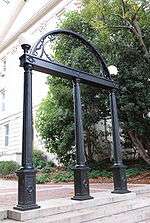
Colleges and universities
- The University of Georgia (UGA), the state's flagship public research university, is the oldest and largest institution of higher learning in Georgia. Founded in 1785, it was the first state-chartered university in the United States.[27]
- Athens Technical College is a Technical College System of Georgia public college. It offers certificates, diplomas, and associate degrees in business, health, technical, and manufacturing-related fields.[28]
- Piedmont College[29] established a campus in Athens in 1995.[30][31]
Media
Newspapers
Athens Banner-Herald publishes daily. UGA has an independent weekly newspaper, The Red & Black. Flagpole Magazine is an alternative newspaper publishing weekly.
Radio and television
Local radio stations include:
- WPLP-LP 93.3 FM, Athens Community Rock Station, Bulldog
- WPUP 100.1 FM, Athens top 40 station featuring all of today's hits. Owned by Cox Radio
- WMSL 88.9 FM, a religious station featuring traditional Christian music and teaching
- WUOG 90.5 FM, UGA's student-run radio station
- WUGA 91.7 and 97.9 FM, an affiliate of Georgia Public Broadcasting and National Public Radio also broadcasting from the UGA campus
- WPPP-LP 100.7 FM (Hot 100), a low-power, non-commercial alternative/progressive rock station
- WRFC (AM) 960 AM, ESPN Radio (formerly Athens' local Top 40 music station during the 1960s and 1970s). Owned by Cox Radio.
- WGAU 1340 AM, news and talk. Owned by Cox Radio.
- WXAG 1470 AM, urban gospel music
In addition, WFSH-FM 104.7 FM, a contemporary Christian music station, is licensed to Athens but based in Atlanta. Atlanta-based Rhythmic Top 40 station WSBB-FM (95.5 The Beat) was formerly licensed to Athens (and also the former home of country station WNGC, which now broadcasts at 106.1) but has since changed its city of license to Doraville, Georgia.
Athens is part of the Atlanta television market. Two Atlanta-market television stations, WGTV (channel 8) and WUVG (channel 34), are licensed to Athens. However their transmitters are in the Atlanta metropolitan area. WGTV broadcasts from the top of Stone Mountain. From 2009 until 2015, UGA operated a television station, WUGA-TV (formerly WNEG-TV) from studios on the UGA campus, but maintained its transmitter near Toccoa, its city of license; what is now WGTA has since moved its studios back to Toccoa after being sold by UGA.
Movies and TV shows produced or shot in Athens
The 1940 film The Green Hand was shot in Athens, using local townspeople and students and faculty from the University of Georgia as its cast. The film had its premiere in Athens in January 1940, at an event attended by Governor Eurith D. Rivers.
The movie Darius Goes West was shot in Athens.[32]
The 1980–81 ABC-TV television series Breaking Away (based on the 1979 film of the same name) was filmed in and around Athens, and made use of the university buildings, and local stone quarries for filming locations.
In 2000, Road Trip was partially filmed on the campus of the University of Georgia. The fictional Ithaca University scenes take place on UGA's historic North Campus.[33]
In 2009, a town, namely 'Rayford', which was loosely based on Athens, appeared in the video game Left 4 Dead 2.
In 2012, Trouble with the Curve was partially filmed at The Globe in downtown Athens.[34]
Also in 2012, The Spectacular Now was filmed entirely in Athens and the surrounding area.[35]
Infrastructure
Transportation
Highways
The city is the focus of U.S. Highways 29, 78, 129, 441, and Georgia State Route 72, and near the eastern terminus of Georgia 316 and the southern terminus of State Route 106. Other state routes in Athens are SR 8 and SR 15, which follow US 29 and 441 respectively, SR 10 which follows US 78 east and west of Athens but deviates to US 78 Business to go through Athens, and SR 15 Alternate which starts at the SR 10 Loop interchange at Milledge Avenue and follows Milledge and Prince Avenues to US 129 which it follows to the north. The Georgia State Route 10 Loop serves as a limited access perimeter. The city is bisected east to west by Broad St/Atlanta Highway (US 78 Bus and SR 10) and north to south by Milledge Avenue (SR 15 Alt). Lumpkin St, Prince Ave (SR 15 Alt), North Ave, and Oconee St (US 78 Bus) along with Broad St are major thoroughfares radiating from Downtown (Athens). College Station Rd and Gaines School Rd are major thoroughfares on the east side of Athens, along with US 78 east (Lexington Rd). On the west side most major thoroughfares intersect US 78 Bus (Broad St/Atlanta Hwy), including Alps Rd/Hawthorne Ave, Epps Bridge Pkwy, and Timothy Rd/Mitchell Bridge Rd.
Airports
Athens-Ben Epps Airport (FAA code AHN) has been operational since 1917. It is located east of downtown outside Georgia State Route 10 Loop and north of US Route 78. AHN qualifies for air service to be provided under the Essential Air Service provisions. Currently, SeaPort Airlines provides commercial air service to Nashville International Airport, TN. Until 2012, Georgia Skies and Wings Air provided commercial air service to Atlanta, and until 2008 (prior to either airline's current AHN service), US Airways provided service to Charlotte. Atlanta's Hartsfield-Jackson International Airport (ATL) is the primary point of departure and arrival for Athenians due to the relative lack of air service to AHN.[36]
Alternative
Athens encourages use of alternative transportation. Bike lanes are provided on major thoroughfares. A rail-to-trail redevelopment is being considered to connect Downtown with the East Side. Organizations such as BikeAthens support and encourage biking. Skateboarding and small scooters are also common sights around UGA campus and Downtown.
Public transit
Bus

Athens Transit provides intracity transit 7 days per week.[37] UGA Campus Transit provides fare-free 24 hours/5 days a week transit around the University of Georgia campus, Milledge Avenue and Prince Avenue on the way to UGA's newest campus, the Health Sciences Campus.[38] Southeastern Stages, a subsidiary of Greyhound Lines,[39] provides intercity bus services.[40] Low cost curbside bus service to Atlanta is also provided by Megabus.
Rail
Athens has no direct passenger rail service; the closest Amtrak stations are located in Atlanta, Gainesville, and Toccoa. Freight service is provided by CSX[41] and Athens Line,[42] the latter having leased tracks from Norfolk Southern. The Georgia Department of Transportation has proposed the city as the terminus of a commuter line that links Atlanta and Gwinnett County along the Georgia 316 corridor.[43]
Utilities
Electric service in Athens-Clarke is provided by two customer-owned electric cooperatives, Walton EMC and Jackson EMC, as well as by Georgia Power, a subsidiary of Southern Company. Water utility is provided by the city. Garbage is provided by private companies according to customer purchase, though the city does offer municipal garbage pick up as a service. Natural gas is supplied by Atlanta Gas Light through various marketers within the deregulated market.
Sister cities
Athens has three sister cities.
Notable people
- Coleman Barks – poet, interpreter of the 13th-century Sufi poet Rumi
- Kevin Barnes – founding member of the band of Montreal
- Kim Basinger – film actress
- Bill Berry – founding member of R.E.M.
- John Berry – singer
- Fred Birchmore - adventurer and centenarian
- Brian Bowles – martial artist
- Henry Hull Carlton - member of the U.S. House of Representatives[44]
- Bradford Cox – indie rock musician
- Jeff Daniels – actor, born in Athens[45]
- Leila Denmark – pediatrician and supercentenarian
- Ben T. Epps – aviation pioneer
- Colt Ford – country musician
- Marianne Gordon – actress
- Henry W. Grady – journalist and orator; helped reintegrate the former Confederate States; coined the phrase "the New South"[46]
- Willie Green – former NFL player
- Forrest Griffin – MMA fighter
- Young Harris – judge, philanthropist, and namesake of Young Harris College
- Henry R. Jackson – Major General in the Georgia militia during the Civil War
- Wadsworth Jarrell – artist
- Andy Johnson – former NFL player
- John Kasay – Carolina Panthers kicker
- Todd Kimsey – actor (Seinfeld)[47]
- Leo Kottke – acoustic guitarist
- NeNe Leakes - reality TV star and actress, raised in Athens
- Jeff Mangum – indie folk musician (lived in Athens until the early 2000s, currently living in New York City)
- Eaddy Mays – television and film actress
- Brian McCann – MLB player, born in Athens[48]
- Lou McGarity – jazz trombonist
- Zach Mettenberger - NFL quarterback
- Fred Mills – classical music professor and Grammy nominee
- Mike Mills – founding member of R.E.M.
- Quentin Moses – football linebacker for the Miami Dolphins, born in Athens
- Madeleine Peyroux – jazz singer, songwriter, and guitarist, born in Athens
- Edwin Pope - Miami sportswriter, born in Athens
- Dunta Robinson – NFL player
- Claire Merritt Hodgson Ruth – second wife of baseball great Babe Ruth
- Mildred Seydell – one of the first female newspaper journalists in Georgia
- Chuck Smith – former NFL defensive end
- Scott Spillane – musician, The Gerbils and Neutral Milk Hotel
- Lucy May Stanton – artist known for portrait miniatures[49]
- Michael Stipe – founding member of R.E.M.
- Keith Strickland – musician, composer and founding member of The B-52s
- Fran Tarkenton – Hall of Fame quarterback
- Laura Slade Wiggins – actress and musician
- Cindy Wilson – founding member of The B-52s
- Ricky Wilson – founding member of The B-52s
Footnotes
- 1 2 "American FactFinder". United States Census Bureau. Archived from the original on 2013-09-11. Retrieved 2008-01-31.
- ↑ "Unification of Athens & Clarke County". athensclarkecounty.com. Retrieved 16 March 2015.
- ↑ "American FactFinder". Factfinder.census.gov. Archived from the original on May 21, 2008. Retrieved 2011-08-20.
- ↑ U.S. Whitehouse OMB Bulletin No. 05-02 Appendix (Code 12020*) Archived March 20, 2006, at the Wayback Machine.
- ↑ http://www.census.gov/population/www/cen2010/cph-t/CPH-T-2.pdf
- ↑ Hynds, Ernest C. (1974; 2009 ed.). Antebellum Athens and Clarke County, Georgia, pp. 2-4. University of Georgia Press.
- ↑ Hynds 1974, p. 9.
- ↑ Antebellum Athens and Clarke County, Georgia By Ernest C. Hynds page 41
- ↑ Seibert, David. "The Stoneman Raid". GeorgiaInfo: an Online Georgia Almanac. Digital Library of Georgia. Retrieved 9 November 2016.
- ↑ Thomas, Frances Taliaferro (2nd ed. 2009). A Portrait of Historic Athens and Clarke County, p. 293. University of Georgia Press.
- ↑ Thomas 2009, pp. 115-17.
- ↑ Doster, Emily Jean & Doster, Gary L. (2011). Athens, pp. 98-99. Arcadia Publishing.
- ↑ Dyer, Thomas G. (1985).The University of Georgia: A Bicentennial History, 1785-1985, p. 329. University of Georgia Press.
- ↑ "Athens, Georgia Climate Summary". Weatherbase. Retrieved 29 December 2015.
- ↑ "NowData - NOAA Online Weather Data". National Oceanic and Atmospheric Administration. Retrieved 2013-06-06.
- ↑ "Annual Estimates of the Resident Population for Incorporated Places: April 1, 2010 to July 1, 2015". Retrieved July 2, 2016.
- ↑ "Census of Population and Housing". Census.gov. Archived from the original on May 11, 2015. Retrieved June 4, 2015.
- ↑ "General Info About Athens-Clarke County". Athensclarkecounty.com. Archived from the original on 24 September 2010. Retrieved 2010-08-14.
- ↑ "Rent Jungle Statistics". Retrieved 18 October 2010.
- ↑ "Population estimates, July 1, 2015, (V2015)". www.census.gov. Retrieved 2016-03-16.
- ↑ Reed, Ryan. "R.E.M., Neutral Milk Hotel Donate Items to Save Iconic Church Steeple" (November 3, 2014) Retrieved November 14, 2014
- ↑ "Best Bars – Esquire". Esquire.com. Retrieved 2011-10-29.
- ↑ "Allen's Hamburgers announces it's closing". Retrieved 12 July 2013.
- ↑ "AthFest - Music Arts Film & Kids Festival, Music Education, Athens, GA Half-Marathon". athfest.com. Retrieved 16 March 2015.
- ↑ Georgia Board of Education. Retrieved July 23, 2010.
- ↑ School Stats. Retrieved July 23, 2010.
- ↑ University of Georgia. Retrieved July 23, 2010.
- ↑ Athens Technical College. Retrieved July 23, 2010.
- ↑ a private liberal arts institution in Demorest
- ↑ Piedmont College- Athens Campus Archived July 17, 2010, at the Wayback Machine.. Retrieved July 23, 2010.
- ↑ "Piedmont At A Glance". Piedmont.edu. 2011-02-08. Archived from the original on 20 July 2011. Retrieved 2011-08-20.
- ↑ Phil Hall (2009). The History of Independent Cinema. BearManor Media. p. 215. ISBN 1-59393-335-5.
- ↑ "Road Trip (2000)". IMDb. Retrieved 16 March 2015.
- ↑ "Athens sees itself in "Trouble with the Curve"". September 21, 2012. Retrieved 12 July 2013.
- ↑ "Soaking up the spotlight". August 17, 2012. Retrieved 12 July 2013.
- ↑ "Athens-Ben Epps Airport". Athensairport.net. Retrieved 2010-08-14.
- ↑ "Home". Athens Transit. 2010-08-09. Archived from the original on 27 August 2010. Retrieved 2010-08-14.
- ↑ "University of Georgia Campus Transit System". Transit.uga.edu. Retrieved 2010-08-14.
- ↑ Athens, GA Greyhound Bus Station Intercity Bus Service
- ↑ "Welcome Traveler, to SOUTHEASTERN STAGES, Inc. Providing Motorcoach Services Since 1933". Southeasternstages.com. Archived from the original on 2010-10-06. Retrieved 2010-08-14.
- ↑ http://www.dot.state.ga.us/maps/Documents/railroad/Georgia_Rail_Map_plain.pdf
- ↑ "The Athens Line". Railga.com. Retrieved 2010-08-14.
- ↑ "Archived copy" (PDF). Archived from the original (PDF) on 2011-06-22. Retrieved 2009-08-30.
- ↑ Hannan, Caryn (1999). Georgia Biographical Dictionary. State History Publications. p. 143.
- ↑ "Jeff Daniels". IMDb. Retrieved 16 March 2015.
- ↑ Who Was Who in America, Historical Volume, 1607–1896. Chicago: Marquis Who's Who. 1963.
- ↑ "Todd Grant Kimsey obituary". Athens Banner-Herald. 2016-09-23. Retrieved 2016-10-08.
- ↑ "Major League Baseball – Brian McCann". Mlb.mlb.com. Retrieved 2011-10-29.
- ↑ Fowler, Betty Alice (2009). "Lucy May Stanton (1875-1931)". New Georgia Encyclopedia. Retrieved 25 March 2013.
Further reading
- Michael J. Gagnon, Transition to an Industrial South: Athens, Georgia, 1830-1870. Baton Rouge, LA: Louisiana State University Press, 2012.
External links
| Wikimedia Commons has media related to Athens, Georgia. |
| Wikivoyage has a travel guide for Athens, Georgia. |
- Athens-Clarke County Guide
- Athens-Clarke city/county government official site
- OnlineAthens – Athens Banner-Herald
- Athens profile, Georgia Encyclopedia
- Athens Historic Newspapers Archive in the Digital Library of Georgia
- Georgia Music Hall of Fame
- Athens-Clarke County Library
- Antebellum Athens and Clarke County, Georgia by Ernest C. Hynds in the Digital Library of Georgia
- Athens Historical Society
